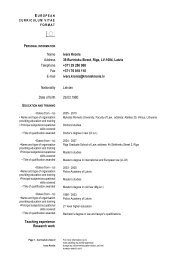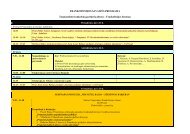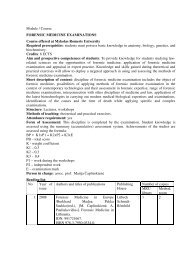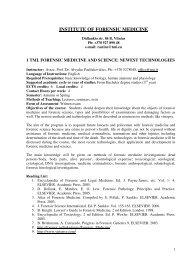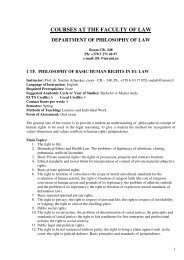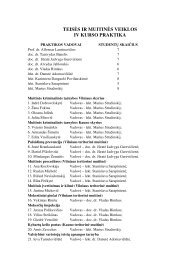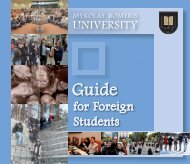Name of Lecturer: Prof. dr. Saulius Arlauskas tfk@mruni.lt
Name of Lecturer: Prof. dr. Saulius Arlauskas tfk@mruni.lt
Name of Lecturer: Prof. dr. Saulius Arlauskas tfk@mruni.lt
Create successful ePaper yourself
Turn your PDF publications into a flip-book with our unique Google optimized e-Paper software.
New Technologies <strong>of</strong> Crime Investigation<br />
<strong>Name</strong> <strong>of</strong> <strong>Lecturer</strong>: pr<strong>of</strong>. <strong>dr</strong>. Egidijus Vidmantas Kurapka, pr<strong>of</strong>. <strong>dr</strong>. Eglė Bilevičiūtė,<br />
Facu<strong>lt</strong>y: Law Facu<strong>lt</strong>y<br />
Department, Contact Details: Department <strong>of</strong> Criminal Procedure and Department <strong>of</strong><br />
Administrative Law & Procedure, tel: +370 5 2714639, eglek@mruni.<strong>lt</strong><br />
Language <strong>of</strong> instruction: English<br />
Level <strong>of</strong> Course Unit: Bachelor, Master<br />
Year <strong>of</strong> Study (if applicable): not applicable<br />
Required prerequisites: none<br />
Learning Outcomes <strong>of</strong> the Course Unit 1 . A student will know/will be able to<br />
operate the received knowledge and practical skills in criminal investigation activities,<br />
to implement different forensic techniques on crime scenes and during criminal<br />
investigation. Students will be able to use received knowledge in practical work <strong>of</strong><br />
forensic expert or detective.<br />
ECTS credits: 6<br />
Contact hours per week: 3<br />
Semester: Spring<br />
Planned Learning Activities and Teaching Methods: lectures, seminars, practical<br />
exercises, self-contained work<br />
Assessment methods and Criteria: Exam (essay, test or oral exam (presentation)).<br />
Exam – 50 % <strong>of</strong> final grade, class work (practical exercises during practical seminar)<br />
– 50 %.<br />
Course content: The main goal <strong>of</strong> subject is to teach students to have special<br />
criminalistics theoretical knowledge and practical skills, which allows better<br />
understand crimes investigation process through studying and having practical work.<br />
The students will find out how to use methods and means <strong>of</strong> the criminalistics tactic<br />
and methodology for investigation process and for solving crimes, how investigator<br />
can use different criminalistic records, databases and information systems in<br />
investigation process. New technologies <strong>of</strong> criminalistics tactics, both the modern<br />
technologies <strong>of</strong> forensic examination, criminalistics methodology methods for<br />
investigation <strong>of</strong> crimes: an introduction to criminalistics science, an introduction to<br />
criminalistics tactic – conception <strong>of</strong> the criminalistics tactic, its structure, some<br />
planning’s aspects <strong>of</strong> the crimes investigation, some tactics aspects <strong>of</strong> the<br />
performance <strong>of</strong> the crimes investigations action, investigation <strong>of</strong> crime scene; an<br />
introduction to the criminalistics methodology – conception <strong>of</strong> the criminalistics<br />
methodology, its structure, conception <strong>of</strong> the criminalistics characteristic <strong>of</strong> the crime<br />
(modus operandi), investigations methodology <strong>of</strong> murder, robbery, bribery and other<br />
types <strong>of</strong> crime; basics <strong>of</strong> criminalistic registration and criminalistic information<br />
systems: main principles <strong>of</strong> criminalistic registration, work with automated fingerprint<br />
identification system, ballistics automated identification system, DNA database and<br />
others different criminalistic systems, their structure, purposes, role in the crime<br />
investigation, Lithuanian criminalistic information system.<br />
Student will have an opportunity to visit different forensic institutions (for example,<br />
the Lithuanian Forensic Science Centre, Lithuanian Police Criminal Investigation<br />
Centre, State Forensic Medicine Service, to acquaint with practical work <strong>of</strong><br />
investigators and forensic scientists.<br />
1 Knowledge, skills, competences that students can demonstrate/acquires during the course<br />
14



